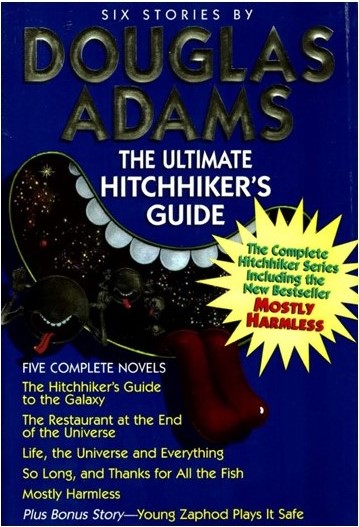Douglas Adams: "The Ultimate Hitchhiker's Guide"This is a work consisting of totally six novels and about 800 pages. It is a completely mad story about the hugeness of the universe and about how small our little planet is compared to this. That is a perspective that can be helpful all the times when one might be overwhelmed by all the problems we are faced with in our little world. It is told with a humour some people may find a bit cynical, but most of us will find pleasure in it. The way of telling involves rather big leaps in space and time, and the persons we meet are given names different from most of what you have ever heard elsewhere. It might from time to time seem a bit demanding to remember in which corner of the universe we are and in which century or millenium the story have brought us, and who are those persons the author is talking about ? So I have to admit I have never made it through all of the 800 pages. I still have a coupple of the novels to go. Still I do not hesitate to recommend everybody else to join this mad universal journey. Besides the fact that the persons incessantly are travelling literally astronomical distances in space during incredibly short time, they also are continuously travelling back and forth in time. To describe situations that may happen because of this, a new grammar is needed to keep some kind of record on when an event actually has happened, for instance when somebody are visiting the century of their great-great-parents. A time mode for a such grammar that is tried to be introduced is "futurum perfectum", but this is soon abandoned, "because one found out, it did not exist." At some point of time in this story it introduces the giant computer that is constructed to calculate what is the meaning of everything. This computer is fed with enormous amonts of data and algoritms. But in spite of its enormous capacity it very soon declares that it will need several centuries to make this calculation. But it is at least able to announce exactly which day the job will be finished. The world looks forward to this date with great expectations and enthusiasm. A big celebration is prepared, flags will be raised, the children do not have to go to school etc. But when the computer finally comes up with its long awaited answer, it turns out to be just "42". This of course causes a great deal of frustration and disappointment among people. Afte a while one realizes that the question to the computer can not have been formulated in the right way. Douglas Adams was born in 1952 but unfortunately died already in 2001. |
|
